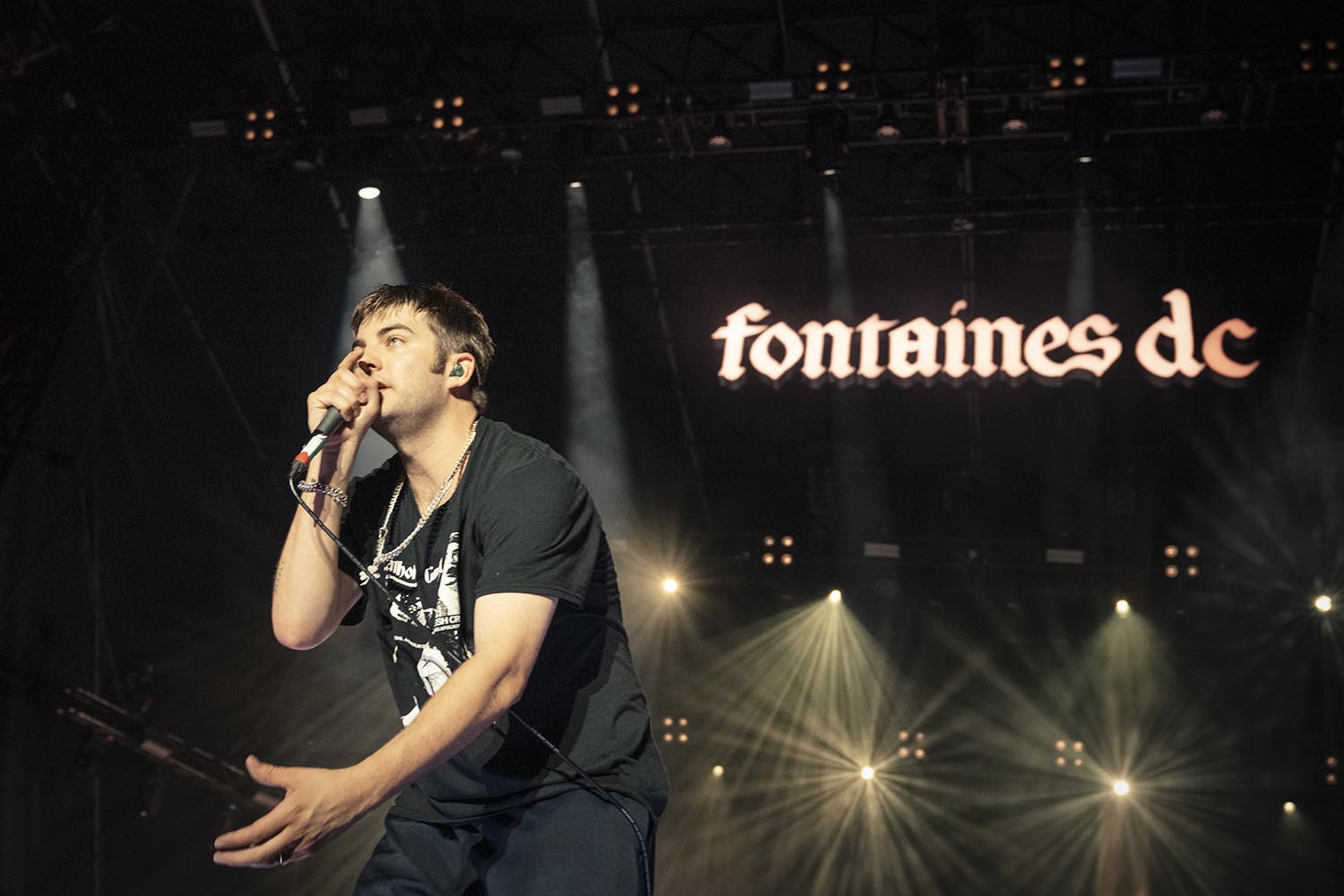Has stadium rock fever taken over Cardiff? Just a couple of weeks ago, Oasis kicked off their reunion tour in the Welsh city, and remnants of the show remain – mostly in the form of the impossibly high volume of Oasis merch you can see being worn around town. And now Fontaines DC have come to town to perform at Cardiff Castle.
Frontman Grian Chatten saunters and leaps around the stage as if he’s at the nearby Principality Stadium; the crowd responds in kind, moshing every chance they get, erupting into hysterics when he whips his hand into the air like the conductor of the world’s most unruly orchestra.
Fontaines DC aren’t stadium headliners – yet. But they sound as though they should be, and their fans clearly see them as such. The Irish five-piece – expanded to six live – exploded in the wake of their fourth album, 2024’s Romance, in part because they had been steadily gaining steam over the prior seven years, but also because few other albums released last year captured the cultural mood so well.
From the record’s aesthetic – futuristic, uncanny valley pop art glowing in the colours of radioactive waste – to its disturbed, end-times lyrics, Romance spoke directly to a generation whose future is totally unclear, who are forced to watch via livestream as the planet is pillaged and governments co-sign atrocities with gusto. Chatten – with the same withering eye he had once used to examine Irish-English relations in a decaying world where hope and love are in short supply – has refashioned himself as a modern rock frontman. Donning Kurt Cobain-esque clout goggles and ostentatious coats, he spits out lyrics that are caustic and clever enough to cut through all the angry but platitudinal post-punk that pops up on Spotify every other day. And, of course, the reference points for Romance – Britpop, the Cure, Lana Del Rey, a little Deftones – seem custom-assembled to appeal to a teenage and twentysomething audience.
It’s clear, based on the crowd at the castle, that it’s worked – the 10,000-strong audience here are very young and very rowdy. People are being picked up in the lines for age verification; baggies are being passed covertly from hand to hand; at least one extremely riled-up punter is dragged kicking and screaming, in a headlock, out of the venue.
The band stir up a frenzy, starting with opener Here’s the Thing, as Chatten strides around in his season-inappropriate peacoat and a black T-shirt that reads “Catholic guilt” and features a nun holding a handgun. They rarely let up over the course of their 90-minute set, which largely eschews slower material in favour of the many, many barnburners the band have amassed over the course of their career.
The crowd is very young and very rowdy. At least one riled-up punter is dragged out, kicking and screaming, in a headlock
The crowd is very young and very rowdy. At least one riled-up punter is dragged out, kicking and screaming, in a headlock
Pleasingly, they don’t make any effort to reinterpret songs for a larger audience: tracks such as Bug and Favourite still sound like those of 80s Rough Trade indie bands; early tracks such as Boys in the Better Land maintain their status as rollicking pub-rock songs. Chatten and co are smart enough to know that their music has always had a steely kind of mass appeal, even on songs such as I Love You, part of this evening’s encore, which acts as both a love letter to Ireland and an excoriation of its contemporary political climate.
During I Love You, the phrase “Free Palestine” appears on the jumbotrons and a gigantic Palestinian flag is projected behind the band, to rapturous response. This, I think, is another reason Fontaines feel so relevant to a young British audience: the band spoke in support of Palestine months before many of their UK contemporaries – and long before many British politicians.
Like countrymen Kneecap – who Chatten has collaborated with, and who supported their 45,000-capacity show in London’s Finsbury Park a few weeks ago – Fontaines’ willingness to speak openly on what experts have argued is a genocide in Gaza feels like a welcome respite from a cultural and political climate in which the atrocities young people are seeing daily online are presented as not worth caring about.
As if to drive the message home, Chatten very rarely speaks between songs this evening – except to say “Free Palestine” after the band performs Big Shot. Even though the show feels like a rave-up, and though the audience treats it as such, Fontaines don’t let the warmth of the crowd puncture their overall message.
Their main set ends with Favourite, a pure love song that acts as a rare moment of calm in their catalogue, and many in the crowd fall into the arms of friends and loved ones, or climb on to shoulders to wave their hands in the air. But their encore leaves us with Starburster, a biting rap-rock song punctuated by Chatten’s rattling gasps for air. It is a dark, and darkly euphoric, note – stadium-sized rock, wrapped in barbed wire.
Photograph by Francesca Jones for the Observer New Review
Newsletters
Choose the newsletters you want to receive
View more
For information about how The Observer protects your data, read our Privacy Policy
